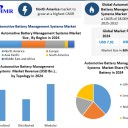
Automotive Battery Management Systems Market refers to the segment of the automotive electronics industry that develops and deploys electronic control circuits to analyze and manage the charging and discharging conditions of vehicle batteries
Global Automotive Battery Management Systems Market: Powering the Future of Electric MobilityThe Global Automotive Battery Management Systems (BMS) Market was valued at USD 7.91 billion in 2024 and is projected to grow at an impressive CAGR of 18.06% from 2025 to 2032, reaching approximately USD 29.85 billion by 2032. The surge is largely fueled by the rapid adoption of electric and hybrid vehicles (EVs and HEVs), ongoing technological innovation, and global efforts to reduce carbon emissions through sustainable transportation solutions.
► Download a Free Sample Report Today: https://www.maximizemarketresearch.com/request-sample/22584/" target="_blank"> https://www.maximizemarketresearch.com/request-sample/22584/" target="_blank"> https://www.maximizemarketresearch.com/request-sample/22584/" target="_blank"> https://www.maximizemarketresearch.com/request-sample/22584/
Market Overview
A Battery Management System (BMS) is a critical component in electric and hybrid vehicles that monitors and manages the charging and discharging of batteries. It ensures safety, efficiency, and longevity by tracking parameters such as voltage, temperature, capacity, and charge cycles. In recent years, BMS technology has evolved with the integration of AI, cloud connectivity, and wireless communication, improving predictive maintenance, real-time diagnostics, and vehicle performance.
Governments across the globe — from the U.S. Department of Energy to the European Union — are heavily investing in next-generation BMS development to support EV battery innovation and circular economy initiatives.
Market Dynamics
Key Drivers
Rising Electric Vehicle Adoption:
Growing consumer interest in EVs, coupled with strict emission standards and incentives such as tax rebates, has boosted BMS demand. These systems are indispensable for maintaining battery safety, optimizing performance, and preventing failures in EVs.
Technological Advancements:
The integration of AI-based SoH (State of Health) and SoC (State of Charge) analytics, as well as cloud-connected BMS platforms, enables predictive diagnostics and enhances vehicle range efficiency.
Government Initiatives:
U.S. DOE’s Battery500 Consortium (USD 120 million funding) focuses on high-energy-density EV batteries.
EU’s Horizon Europe Program (EUR 2.9 billion) emphasizes AI-driven BMS for sustainable systems.
China’s NEV Battery Fund (CNY 5 billion) supports cloud-connected BMS with thermal management.
Restraints
Despite rapid innovation, high system costs — driven by advanced sensors and electronic components — remain a key barrier, particularly in cost-sensitive markets. The integration of sophisticated monitoring systems adds complexity and increases production expenses.
Segmentation Insights
By Battery Type:
Lithium-ion batteries dominated in 2024, owing to their superior energy density, light weight, and long life cycle, making them the preferred choice for EVs. Lead-acid batteries continue to serve traditional internal combustion engine vehicles.
By Topology:
The modular topology segment is expected to witness the fastest growth. Modular BMS designs enhance scalability, reduce wiring complexity, and improve system reliability—ideal for both smart grids and electric vehicles.
By Application:
Electric vehicles lead the market, followed by renewable energy systems and telecommunication. Growing use of second-life batteries for grid storage adds new opportunities for BMS deployment.
► Download a Free Sample Report Today: https://www.maximizemarketresearch.com/request-sample/22584/" target="_blank"> https://www.maximizemarketresearch.com/request-sample/22584/" target="_blank"> https://www.maximizemarketresearch.com/request-sample/22584/" target="_blank"> https://www.maximizemarketresearch.com/request-sample/22584/
Regional Insights
North America
Held a 29.9% share in 2024, supported by strong EV adoption, government funding for R&D, and major players such as Texas Instruments and Analog Devices. Advanced wireless and intelligent BMS solutions dominate the region’s market landscape.
Asia Pacific
Expected to be the fastest-growing region, led by China, Japan, and South Korea — the global leaders in lithium-ion battery production. Government incentives, rapid EV manufacturing expansion, and local giants like CATL and Panasonic strengthen the region’s dominance.
Europe
Holds a major share driven by stringent environmental policies, rising EV production, and prominent players like Bosch, Continental AG, and AVL LIST GmbH. The region is also a hub for solid-state battery BMS development.
Competitive Landscape
The global BMS market is highly competitive, with established electronics manufacturers, automotive suppliers, and startups vying for technological leadership.
Key Players Include:
Texas Instruments Inc. (U.S.)
Analog Devices Inc. (U.S.)
NXP Semiconductors NV (Netherlands)
Robert Bosch GmbH (Germany)
Continental AG (Germany)
Panasonic Corporation (Japan)
Denso Corporation (Japan)
Toshiba Corporation (Japan)
CATL (China)
LG Energy Solution (South Korea)
► Download a Free Sample Report Today: https://www.maximizemarketresearch.com/request-sample/22584/" target="_blank"> https://www.maximizemarketresearch.com/request-sample/22584/" target="_blank"> https://www.maximizemarketresearch.com/request-sample/22584/" target="_blank"> https://www.maximizemarketresearch.com/request-sample/22584/
Recent Developments
Tesla (U.S.) – March 2024:
Unveiled AI-driven BMS for predictive battery analytics, extending EV battery life by 20%.
CATL (China) – June 2024:
Introduced Qilin Wireless BMS for enhanced EV safety and performance.
Bosch (Germany) – September 2024:
Launched BMS 6.0, compatible with 800V architectures for ultra-fast EV charging.
LG Energy Solution (South Korea) – February 2025:
Developed BMS optimized for solid-state batteries to improve safety and performance.
Panasonic (Japan) – April 2025:
Partnered with Toyota on cloud-connected BMS for real-time fleet battery monitoring.
Market Trends
Category Trend Example Impact
Digital Transformation Cloud-connected BMS for real-time analytics NXP’s Cloud BMS integrated with BMW fleet (2025) Enables predictive maintenance, reducing battery failure by 30%
Regulatory Push Stricter EV battery safety standards CATL’s ASIL-D certified BMS (2025) 80% of EVs to require ISO 26262 BMS by 2026
AI Integration AI-based SoH prediction models Analog Devices’ Battery AI Core Extends battery life by 15% and reduces warranty costs
Future Outlook
The Automotive Battery Management Systems Market is on track to become a cornerstone of the global EV ecosystem, enabling the transition to a low-carbon economy. Future advancements will revolve around:
AI-driven diagnostics and cloud integration
Thermal management optimization
Vehicle-to-Grid (V2G) and second-life battery applications
Integration with solid-state and lithium-sulfur battery technologies
By 2032, the market will play a central role in shaping the efficiency, safety, and sustainability of next-generation mobility solutions.






 supriyamaximize
supriyamaximize
 johnlark1
johnlark1 jr6732484
jr6732484 ameliano111
ameliano111